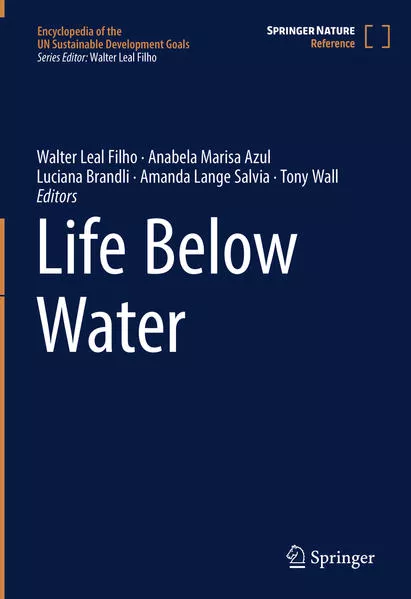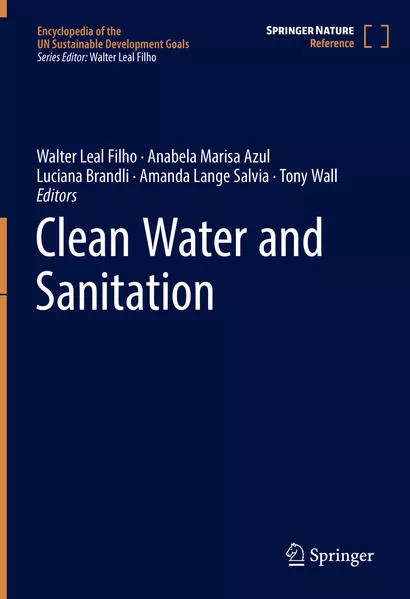Chronologie aller Bände (1 - 2)
Die Reihenfolge beginnt mit dem Buch "Life Below Water". Wer alle Bücher der Reihe nach lesen möchte, sollte mit diesem Band von Walter Leal Filho beginnen. Der zweite Teil der Reihe "Life Below Water" ist am 27.04.2022 erschienen. Die Reihe umfasst derzeit 2 Bände. Der neueste Band trägt den Titel "Clean Water and Sanitation".
- Anzahl der Bewertungen für die gesamte Reihe: 0
- Ø Bewertung der Reihe: 0
- Autor: Leal Filho, Walter
- Anzahl Bewertungen: 0
- Ø Bewertung:
- Medium: Buch
- Veröffentlicht: 27.04.2022
- Genre: Politik
Life Below Water
The problems related to the process of industrialisation such as biodiversity depletion, climate change and a worsening of health and living conditions, especially but not only in developing countries, intensify. Therefore, there is an increasing need to search for integrated solutions to make development more sustainable. The United Nations has acknowledged the problem and approved the “2030 Agenda for Sustainable Development”. On 1st January 2016, the 17 Sustainable Development Goals (SDGs) of the Agenda officially came into force. These goals cover the three dimensions of sustainable development: economic growth, social inclusion and environmental protection.
The Encyclopedia of the UN Sustainable Development Goals comprehensively addresses the SDGs in an integrated way. It encompasses 17 volumes, each one devoted to one of the 17 SDGs. This volume is dedicated to SDG 14 “Conserve and sustainably use the oceans, seas and marine resources for sustainable development". Marine and coastal bio-resources, play an essential role in human well-being and social and economic development. This volume addresses this sustainability challenge providing the description of a range of terms, which allows a better understanding and fosters knowledge about it.Concretely, the defined targets are:
- Prevent and significantly reduce marine pollution of all kinds, in particular from land-based activities, including marine debris and nutrient pollution
- Sustainably manage and protect marine and coastal ecosystems to avoid significant adverse impacts, including by strengthening their resilience, and take action for their restoration in order to achieve healthy and productive oceans
- Minimize and address the impacts of ocean acidification, including through enhanced scientific cooperation at all levels
- Effectively regulate harvesting and end overfishing, illegal, unreported and unregulated fishing and destructive fishing practices and implement science-based management plans, in order to restore fish stocks in the shortest time feasible, at least to levels that can produce maximum sustainable yield as determined by their biological characteristics
- Conserve at least 10 per cent of coastal and marine areas, consistent with national and international law and based on the best available scientific information
- Prohibit certain forms of fisheries subsidies which contribute to overcapacity and overfishing, eliminate subsidies that contribute to illegal, unreported and unregulated fishing and refrain from introducing new such subsidies, recognizing that appropriate and effective special and differential treatment for developing and least developed countries should be an integral part of the World Trade Organization fisheries subsidies negotiation 16
- Increase the economic benefits to small island developing states and least developed countries from the sustainable use of marine resources, including through sustainable management of fisheries, aquaculture and tourism
- Increase scientific knowledge, develop research capacity and transfer marine technology, taking into account the Intergovernmental Oceanographic Commission Criteria and Guidelines on the Transfer of Marine Technology, in order to improve ocean health and to enhance the contribution of marine biodiversity to the development of developing countries, in particular small island developing states and least developed countries
- Provide access for small-scale artisanal fishers to marine resources and markets
- Enhance the conservation and sustainable use of oceans and their resources by implementing international law as reflected in the United Nations Convention on the Law of the Sea, which provides the legal framework for the conservation and sustainable use of oceans and their resources, as recalled in paragraph 158 of “The future we want”
Ulisses M. Azeiteiro, Anabela Marisa Azul, Luciana Brandli, Ernesto Brugnoli, Ana M. M. Gonçalves, Giulia Guerriero, Nathalie Hilmi, Walter Leal Filho, Filipe Martinho, Fernando Morgado, Saleem Mustafa, Nidhi Nagabhatla, Melissa Nursey-Bray, Jessica M. Savage, Teppo Vehanen
- Autor: Leal Filho, Walter
- Anzahl Bewertungen: 0
- Ø Bewertung:
- Medium: Buch
- Veröffentlicht: 11.06.2022
- Genre: Politik
Clean Water and Sanitation
The problems related to the process of industrialisation such as biodiversity depletion, climate change and a worsening of health and living conditions, especially but not only in developing countries, intensify. Therefore, there is an increasing need to search for integrated solutions to make development more sustainable. The United Nations has acknowledged the problem and approved the “2030 Agenda for Sustainable Development”. On 1st January 2016, the 17 Sustainable Development Goals (SDGs) of the Agenda officially came into force. These goals cover the three dimensions of sustainable development: economic growth, social inclusion and environmental protection.
The Encyclopedia of the UN Sustainable Development Goals comprehensively addresses the SDGs in an integrated way. It encompasses 17 volumes, each devoted to one of the 17 SDGs. This volume is dedicated to SDG 6 "Ensure availability and sustainable management of water andsanitation for all". Water and sanitation are fundamental to human well-being. Integrated water resources management is essential to ensure availability and sustainable management of water and sanitation for all and to the realization of Sustainable Development.
Concretely, the defined targets are:
- Achieve universal and equitable access to safe and affordable drinking water for all
- Achieve access to adequate and equitable sanitation and hygiene for all and end open defecation, paying special attention to the needs of women and girls and those in vulnerable situations
- Improve water quality by reducing pollution, eliminating dumping and minimizing release of hazardous chemicals and materials, halving the proportion of untreated wastewater and substantially increasing recycling and safe reuse globally
- Substantially increase water-use efficiency across all sectors and ensure sustainable withdrawals and supply of freshwater to address water scarcity and substantially reduce the number of people suffering from water scarcity
- Implement integrated water resources management at all levels, including through transboundary cooperation as appropriate
- Protect and restore water-related ecosystems, including mountains, forests, wetlands, rivers, aquifers and lakes
- Expand international cooperation and capacity-building support to developing countries in water- and sanitation-related activities and programmes, including water harvesting, desalination, water efficiency, wastewater treatment, recycling and reuse technologies
- Support and strengthen the participation of local communities in improving Uwater and sanitation management
Ulisses M. Azeiteiro, Anabela Marisa Azul, Luciana Brandli, Dominique Darmendrail, Despo Fatta–Kassinos, Walter Leal Filho, Susan Hegarty, Amanda Lange Salvia, Albert Llausàs, Paula Duarte Lopes,Javier Marugán, Fernando Morgado, Wilkister Nyaora Moturi, Karel F. Mulder, Alesia Dedaa Ofori, Sandra Ricart

